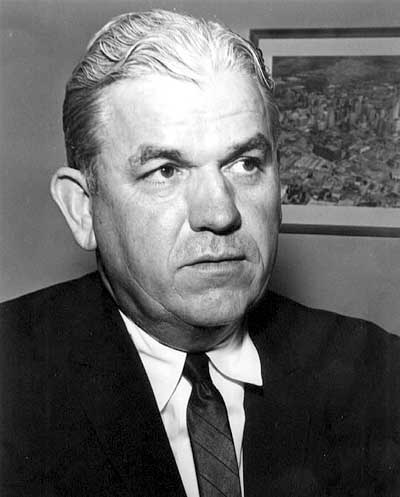Henry Wade (Henry Menasco Wade)

Henry Wade, one of eleven children, was born in Rockwall County, Texas, outside Dallas. A good student, Wade, along with five of his seven brothers, entered the legal profession. Shortly after graduating from the University of Texas at Austin, in 1939, Wade joined the Federal Bureau of Investigation, headed by J. Edgar Hoover. Wade’s assignment as Special Agent was to investigate espionage cases along the US East Coast and in South America. During World War II, Wade served in the US Navy, taking part in the invasions of the Philippines and Okinawa. He was first elected Rockwall County Attorney. In 1947, Wade joined the Dallas County District Attorney’s Office. He won election to the top job only four years later, a position he would hold for 36 years, until his retirement in 1987. Henry Wade was the unsuccessful Democratic candidate in 1956 against the staunchly conservative Republican Representative Bruce Alger of Dallas County. Alger prevailed to win his second of five House terms, 102,380 (55.6 percent) to 81,705 (44.4 percent). After his defeat, Wade remained district attorney for another 30 years.
In the early afternoon hours of November 22, 1963, President John F. Kennedy was assassinated in Downtown Dallas, just blocks from Wade’s office in the Dallas County Courthouse. Henry Wade lost the opportunity to try Lee Harvey Oswald for Kennedy’s murder when a Dallas nightclub operator, Jack Ruby, shot the suspect just two days later, but he became known nationally for prosecuting Ruby for Oswald’s murder. Wade closely supervised the Ruby trial, but he appointed his assistant, William Alexander, to conduct the courtroom proceedings. Henry Wade and Alexander confronted Ruby’s lawyers, famed trial lawyer Melvin Belli and Texas counsellor Joe Tonahill, in a lengthy trial that concluded on March 14, 1964, with a verdict for Ruby of “guilty of murder with malice.” The jury had deliberated for less than three hours before arriving at its decision, and it recommended a death penalty.
Henry Wade, as Dallas County District Attorney, was the named defendant when attorneys Sarah Weddington and Linda Coffee mounted a 1970 constitutional challenge to the Texas criminal statutes prohibiting doctors from performing abortions. Norma McCorvey (“Jane Roe”), a single woman who has since recanted the claim that her pregnancy was the result of rape, was signed up as the representative plaintiff. The challenge sought both a declaratory judgment that the Texas criminal abortion statutes were unconstitutional on their face and an injunction restraining the defendant from enforcing the statutes. The lower court refused to grant Roe’s desired injunction but declared the criminal abortion statutes were void. Both sides cross-appealed. The case worked its way through the appellate process, culminating in the Supreme Court’s landmark 1973 Roe v. Wade decision that made abortion legal in the United States. Despite the loss of Roe v. Wade and its unpopularity with conservative voters, Wade himself was not blamed, and his political career did not suffer. He continued to serve in office for an additional 14 years, and he remained a fixture around the new Crowley Courts Building, where members of the Dallas Bar called him “the Chief.” In 1995, the Henry Wade Juvenile Justice Center was named in his honor, and in 2000, shortly before his death from Parkinson’s disease, Texas Lawyer magazine named him as one of the 102 most influential lawyers of the 20th century.
Born
- November, 11, 1914
- USA
- Rockwall County, Texas
Died
- March, 01, 2001
- USA
- Dallas, Texas
Cause of Death
- Parkinson's disease
Cemetery
- Sparkman Hillcrest Memorial Park
- Dallas, Texas
- USA



